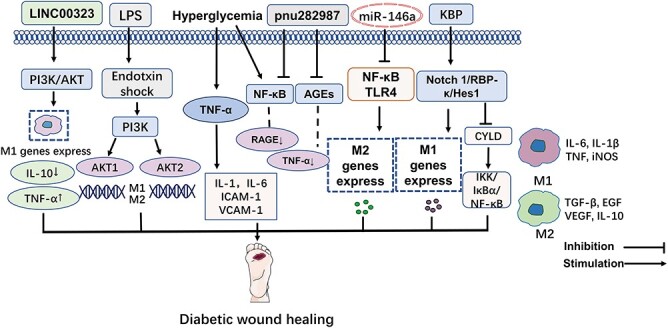Figure 3.

NF-κB and PI3K/AKT signaling pathways affect macrophage polarization in diabetic wounds. The PI3K/AKT/mTOR pathway is crucial for cell migration, and activation of the PI3K/Akt pathway can regulate macrophage polarization, participate in inflammatory responses and affect cell proliferation and wound healing in diabetic wounds. Under hyperglycemia, the activation of NF-κB persisted, the stimulation of the NF-κB signaling pathway promoted the polarization of M1 macrophages and the inhibition of NF-κB signaling pathway promoted the polarization of M2 macrophages. When drugs that improve the continuous activation of NF-κB act on chronic wounds, they can regulate the release of inflammatory factors during wound healing and promote the polarization of M2 macrophages by inhibiting the NF-κB axis, thereby promoting wound healing in diabetic ulcers. TNF-α tumor necrosis factor- α, AGEs advanced glycation end-products, RAGE receptor for advanced glycation end-product, KBP kallikrein-binding protein, CYLD cylindromatosis tumor suppressor protein, TLR4 toll-like receptor 4, ICAM-1 intercellular cell adhesion molecule-1, VCAM-1 vascular cell adhesion molecule-1, NF-κB nuclear factor kappa-B, IL inteleukin, TGF-β transforming growth factor-beta, VEGF vascular endothelial growth factor, EGF epidermal growth factor, iNOS inducible nitric oxide synthase
